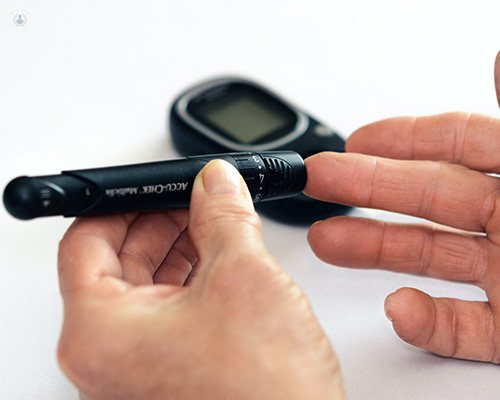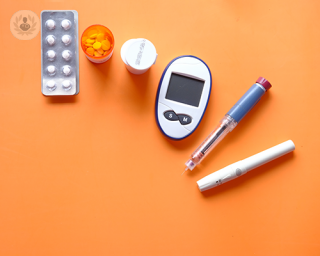Diabetic nephropathy
What is diabetic nephropathy?
Diabetic nephropathy, also referred to as diabetic kidney disease, is a type of kidney disease that can occur as a complication in diabetic patients. It is a progressive condition that develops over time, and is one of the leading causes of kidney failure. Diabetic nephropathy is one the main reasons behind kidney transplant.

Development of diabetic nephropathy
Diabetic nephropathy is one of the leading causes of end stage renal failure. Early diagnosis, when the disease is in its early stages, is crucial to be able to start treatment and avoid kidney damage. When kidney damage worsens, there is more protein in the urine. If the damage continues to worsen, the patient may need dialysis or a kidney transplant. People with diabetic nephropathy will often also have high blood pressure, heart disease, and eye damage.
Here is how the disease develops:
-
High blood sugar levels:
When blood sugar levels are poorly managed in patients with diabetes over a long period of time, it can lead to damage to the small blood vessels in the kidneys. -
Kidney damage:
When the tiny blood vessels in the kidney (known as glomeruli) become damaged, they cannot filter waste and excess fluids effectively, leading to kidney damage. -
Protein leakage:
As the kidney's filtration system is not working as it should, it can result in the leakage of protein (albumin) from the blood into the urine. This is called proteinuria. -
Reduced kidney function:
As the disease continues to progress, the kidneys become less efficient at filtering waste and maintaining the balance of electrolytes and fluids in the body.
Diabetic nephropathy can then lead to Chronic Kidney Disease (CKD) and ultimately, kidney failure.
What are the symptoms?
In many cases, symptoms are not noticeable at the beginning of the disease, but they worsen with disease progression. The kidney damage may have already started 5 to 10 years before the first symptoms are evident. Some people affected may have a loss of appetite, feel tired most of the time, and experience general malaise. Other common symptoms include:
- headache
- nausea
- vomiting
- swollen legs
- altered blood pressure
- protein in the urine
- increased need to urinate
- needing less insulin
- confusion or difficulty concentrating
- fatigue.
Regularly having blood and urine tests done can help diagnose diabetic nephropathy sooner.
Medical tests
There are different tests to diagnose diabetic nephropathy at an early stage. It is recommended that the patient have a urine test once per year to check for albumin in the urine. When there is excess protein in the urine it can be an indication of kidney damage. High blood pressure should be monitored in patients with diabetic nephropathy. It can develop quickly and/or become difficult to control. The specialist will also check the kidneys yearly via blood tests, or other types of tests, to check for:
- protein in the urine for 24 hours
- blood levels of phosphorus, calcium, bicarbonate, PTH, and potassium
- haemoglobin
- haematocrit
- protein electrophoresis in urine.
A kidney biopsy can also confirm the diagnosis, but it is only carried out if there are any doubts.
What causes diabetic nephropathy?
There are different factors that could cause this kidney disease to develop:
- Evolution time of diabetes. Roughly around 20 years from the onset of diabetes, 50% of patients may develop diabetic nephropathy.
- High blood pressure. This is the most serious risk factor for diabetic patients for developing diabetic nephropathy.
- Glycosylated haemoglobin. There is a link between controlling blood sugar levels and the percentage of glycated haemoglobin and microvascular lesions. Controlling blood sugar levels slows the development of glomerulosclerosis.
- Hyperlipoproteinemia.
- Obesity.
- Other risk factors include; not controlling blood sugar levels, family members who have diabetes, kidney issues, or smoking.
What is the treatment?
Personalised and appropriate treatment plans can delay damage, providing it is identified in time. When there is more protein in the urine, the kidney damage is slowly getting worse. If this begins to happen, there are three things that specialists recommend:
- Monitor blood pressure. Controlling blood pressure to be below 140/90 mm/Hg is a good way to delay kidney damage. In order to achieve this, your doctor may prescribe medications to lower your blood pressure and protect the kidneys from further damage. These medications can delay kidney damage, even if blood pressure is at a healthy rate.
- Monitor blood sugar levels. Following a healthy diet, exercising regularly, taking the needed medications or insulin as supervised by a specialist, and monitoring blood sugar levels can delay the onset of kidney damage.
- Other ways to protect the kidneys. Avoid taking painkillers such as ibuprofen or naproxen as they are known to affect kidney function. Your specialist will recommend what pain relief medication is best for you. It is important to be aware of urinary tract infection symptoms and getting the right treatment as soon as possible. Low levels of vitamin D have been known to affect kidney diseases. Your specialist can recommend and prescribe vitamin D supplements if necessary.
Which specialist should I see?
A nephrologist studies the kidneys and treats the diseases and conditions affecting them.















